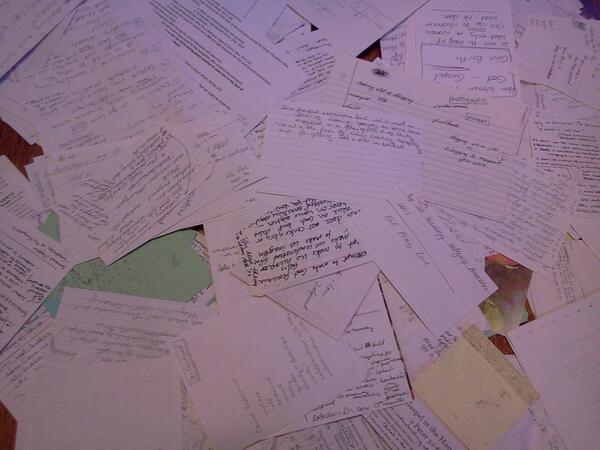Think Before You Write
This is a second post in a recurring series that addresses questions of craft for those writing in “the-in-between.” ______________________________________________________________________
 Q: My friend Rachael and I were talking a few days ago when she brought up this question: How do you find time to write, especially in the busy seasons of life?
Q: My friend Rachael and I were talking a few days ago when she brought up this question: How do you find time to write, especially in the busy seasons of life?
A: Those of us writing in “the-in-between” have a lot of questions, but this is THE question. Whether you work a full-time job, are invested in a busy season of ministry, or are running after toddlers, finding time to write is one of the biggest obstacles to actually... writing. (Case in point: While I was in the middle of writing this post, my husband came down stairs to ask me to cut his hair.) Last week, Taryn Hutchison offered some helpful tips at Redbud Writers Guild; and when I posed Rachael's question to a group of writing friends, several sagely pointed out the need to keep reasonable expectations. Some seasons of life will simply be more productive than others.
Still others swear by early rising, spouses who pitch in, and dedicating space in your weekly calendar. Truthfully, though, I’m not that organized. In our house, no two weeks (let alone days) look the same. And while I do sometimes stay up late to work a piece, it’s usually because I can’t sleep, not because I’ve reached a new level of productivity. But I have found one technique that I swear by. In fact, if I didn't do this one thing, I'm convinced that I'd never have enough time to write.
So what do I do? I write on my feet. More accurately, I think on my feet.
Many people mistakenly believe that writing is the work of arranging words on a page, of finding just the right sequence of letters and punctuation. They believe that "writing" happens with pen and notebook in hand or sitting in front of a computer. But writing is NOT simply about words; it is just as much about the about the ideas behind the words. And until you learn to think through your ideas, all the time in the world won’t be enough to write about them.
The good news is that you can think anywhere. Ideas bombard me in the shower, at the grocery store, listening to the news, and scrolling through Facebook; the place they are least likely to form is sitting in front of a computer screen. If I wait to begin "writing" until I plop myself in a chair, more often than not, the words won’t form because the ideas haven’t formed yet.
So I’ve learned to think on my feet. And as the ideas come, I’ve learned to capture them and squirrel them away. Forget Scrivener; the first draft of Made for More was written on the backs of church bulletins, restaurant napkins, and grocery receipts.

I also make notes on my phone, send myself emails, and record myself talking if my hands aren’t free. (Nor am I above asking my 10yo daughter to act as my secretary—“What’s trans-sub-stan-ti-a-tion mean, Mommy?”) By the time I actually sit down in front of a screen, it’s just a matter of arranging the bits and bobs into a coherent whole.
Don’t misunderstand. When I say “bits and bobs,” I mean a thesis and all the examples that support that thesis. For me, the process of collecting these can take anywhere from a couple days to several weeks, but I don’t sit down in front of the screen it until everything “clicks” –until all the random thoughts actually form into a concept. And then once I know what to “write,” the time I do have to write is much more productive.
That doesn't mean that I don't struggle once I sit down, but when I do, it’s usually because I need to step away and think about the ideas some more. If the words don’t come easily, I don’t waste my time sitting in front of the computer because I probably need to spend more time thinking. So I go clean a toilet, make dinner, or do laundry. But I keep thinking while I do.
I don’t want to make it sound simpler than it is. I don’t want to minimize the time that good writing takes. And I certainly don’t want to suggest that you check out of your real life in order to puzzle out the mysteries of the universe. But you probably have more time to write than you realize because finding time to write well doesn't begin with hours in a coffee shop, long walks along a placid lake, or evenings spent scribbling in your moleskin notebook. Finding time to write well begins with thinking well.